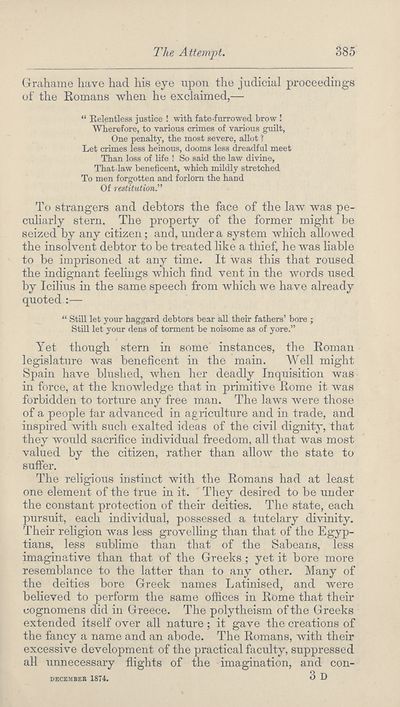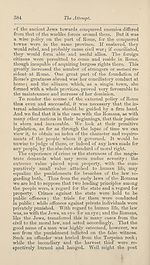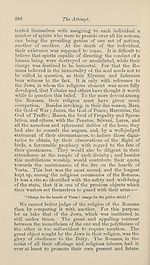Download files
Complete book:
Individual page:
Thumbnail gallery: Grid view | List view

llie Attemiyt. 385
Grahame have had his eye upon the judicial proceedings
of the Eoinans when he exclaimed,—
" Relentless justice I with fate-furrowed brow .'
Wherefore, to various crimes of various guilt,
One penalty, the most severe, allot ?
Let crimes less heinous, dooms less dreadful meet
Than loss of life ! So said the law divine.
That law beneficent, which mildly stretched
To men forgotten and forlorn the hand
Of restitution.'"
To strangers and debtors the face of the law was pe¬
culiarly stern. The property of the former might be
seized by any citizen ; and, under a system which allowed
the insolvent debtor to be treated like a thief, lie was liable
to be imprisoned at any time. It was this that roused
the indignant feelings which find vent in the words used
by Icilius in the same speech from Avhich we have already
quoted :—•
" Still let your haggard debtors bear all their fathers' bore ;
Still let your dens of torment be noisome as of yore."
Yet though stern in some instances, the Roman
legislature was beneficent in the main. Well might
Spain have blushed, when her deadly Inquisition was
in force, at the knowledge that in primitive Rome it was
forbidden to torture any free man. The laws Avere those
of a people tar advanced in agriculture and in trade, and
inspired with such exalted ideas of the civil dignity, that
they would sacrifice individual freedom, all tliat was most
valued by the citizen, rather than allow the state to
suffer.
The religious instinct with the Romans had at least
one element of the true in it. Tliey desired to be under
the constant protection of their deities. The state, each
pursuit, each individual, possessed a tutelary divinity.
Their religion was less grovelling than that of the Egyp¬
tians, less sublime than that of the Sabeans, less
imaginative than that of the Greeks ; yet it bore more
resemblance to the latter than to any other. Many of
the deities bore Greek names Latinised, and were
believed to perform the same offices in Rome that their
cognomens did in Greece. The polytheism of the Greeks
extended itself over all nature ; it gave the creations of
the fancy a name and an abode. The Romans, with their
excessive development of the practical faculty, suppressed
all unnecessary flights of the imagination, and con-
DECEMBEB 1874. '5 U
Grahame have had his eye upon the judicial proceedings
of the Eoinans when he exclaimed,—
" Relentless justice I with fate-furrowed brow .'
Wherefore, to various crimes of various guilt,
One penalty, the most severe, allot ?
Let crimes less heinous, dooms less dreadful meet
Than loss of life ! So said the law divine.
That law beneficent, which mildly stretched
To men forgotten and forlorn the hand
Of restitution.'"
To strangers and debtors the face of the law was pe¬
culiarly stern. The property of the former might be
seized by any citizen ; and, under a system which allowed
the insolvent debtor to be treated like a thief, lie was liable
to be imprisoned at any time. It was this that roused
the indignant feelings which find vent in the words used
by Icilius in the same speech from Avhich we have already
quoted :—•
" Still let your haggard debtors bear all their fathers' bore ;
Still let your dens of torment be noisome as of yore."
Yet though stern in some instances, the Roman
legislature was beneficent in the main. Well might
Spain have blushed, when her deadly Inquisition was
in force, at the knowledge that in primitive Rome it was
forbidden to torture any free man. The laws Avere those
of a people tar advanced in agriculture and in trade, and
inspired with such exalted ideas of the civil dignity, that
they would sacrifice individual freedom, all tliat was most
valued by the citizen, rather than allow the state to
suffer.
The religious instinct with the Romans had at least
one element of the true in it. Tliey desired to be under
the constant protection of their deities. The state, each
pursuit, each individual, possessed a tutelary divinity.
Their religion was less grovelling than that of the Egyp¬
tians, less sublime than that of the Sabeans, less
imaginative than that of the Greeks ; yet it bore more
resemblance to the latter than to any other. Many of
the deities bore Greek names Latinised, and were
believed to perform the same offices in Rome that their
cognomens did in Greece. The polytheism of the Greeks
extended itself over all nature ; it gave the creations of
the fancy a name and an abode. The Romans, with their
excessive development of the practical faculty, suppressed
all unnecessary flights of the imagination, and con-
DECEMBEB 1874. '5 U
Set display mode to: Large image | Transcription
Images and transcriptions on this page, including medium image downloads, may be used under the Creative Commons Attribution 4.0 International Licence unless otherwise stated. ![]()
| Ladies' Edinburgh Debating Society publications > Attempt > Volume 10 > (397) Page 385 |
|---|
| Permanent URL | https://digital.nls.uk/104314610 |
|---|
| Attribution and copyright: |
|
|---|

